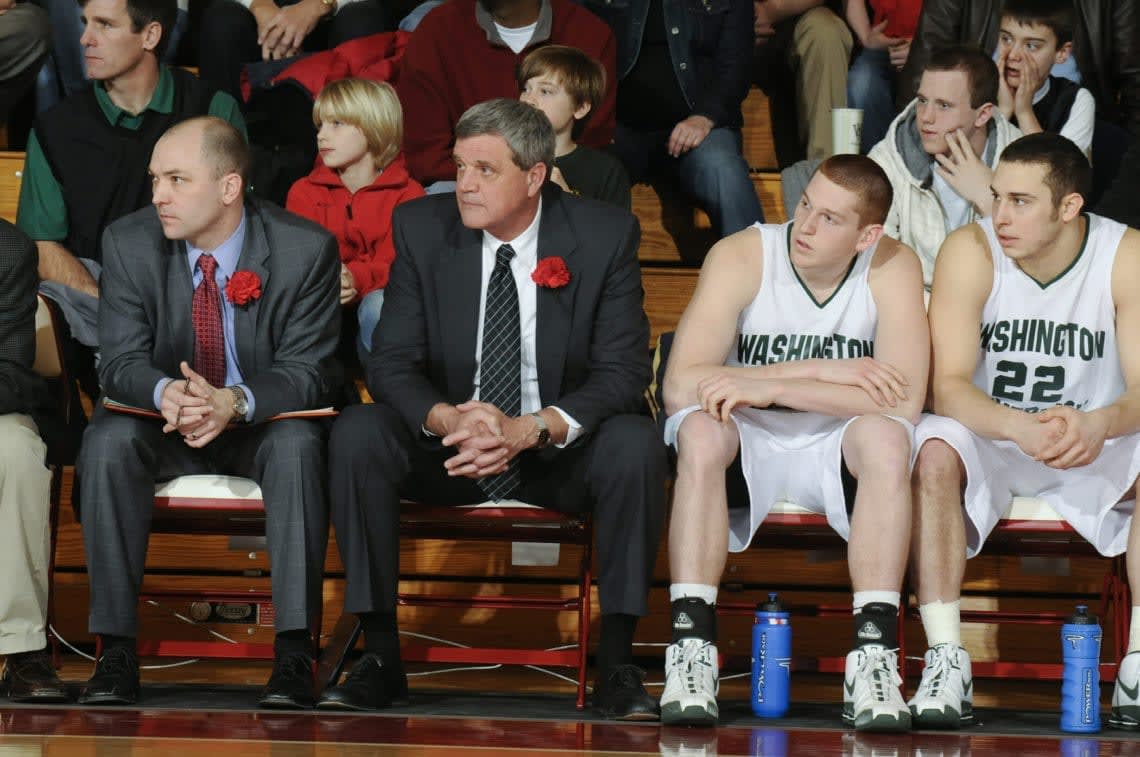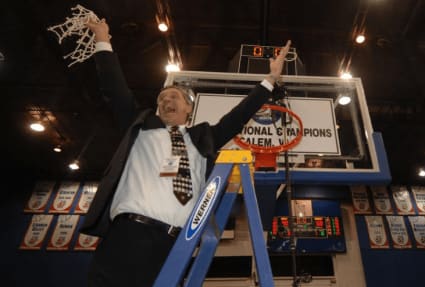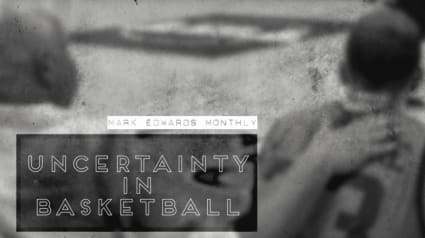Mark Edwards retired from coaching in 2018 after 46 total years, 37 of those as the head coach at NCAA Division III Washington University in St. Louis. He collected 685 career wins, 34-straight winning seasons from 1984-2018, 20 NCAA Tournament appearances, three Final Fours (2007-09) and two national championships (2008, 2009).
This is the fourth installment of our ongoing series chronicling my conversations with Mark Edwards, with a new topic each month. In our first talk, we discussed how the ongoing COVID-19 situation can and will affect recruiting, and in our second, we covered the differences between good, great and championship teams. In the third, we went over how basketball has changed through the years. This month, it was about the current uncertainty surrounding the sport.
Mark Edwards Monthly: Basketball’s Current Uncertainty
Justin Meyer: Everything has uncertainty in it right now. Basketball is no exception.
Mark Edwards: The thing that’s probably the most perplexing is that there’s no answer as long as it’s still evolving. There’s no concrete answer. All you can do is prepare for what’s going to happen tomorrow, because you don’t know what it’s going to be. I don’t think I’ve ever experienced a scenario in a sport that is as uncontrollable by myself or by anybody as this. Anything else you ever came across, whatever it might be, there was always somebody you can appeal to or go to for a resolution of the issue. There isn’t anything with this, and I think that’s the frustration a lot of people are feeling.
JM: You never coached through a pandemic, and neither has anyone else who’s alive. But in your decades of coaching, some massive political and cultural events did happen. How did you try to keep your team focused on basketball when there were much larger things looming overhead?
Mark Edwards: The number one thing was 9/11, because that was something that was very concrete and brought issues of the world into our country. Coaching a group of guys who are very knowledge, who understand what’s going on and are very passionate about basketball, how to take those things and be able to wave them together is the challenge you have.
You can’t deny it. You can’t go in there and say, “Let’s put this behind us, let’s put this out of our minds, let’s go play basketball.” It doesn’t work that way. You can compartmentalize to a certain extent, but the issue is always going to be in the background, and that’s what you have to deal with.

I think the best way to do it is to challenge your players to be able to shift focus of what they’re doing. Doesn’t mean you’re prioritizing things, but you’re shifting your focus to something you want to accomplish. If you read accounts of people who do heroic deeds and go into battle and do different things that mean something to the world, you’ll always see that they, in the time, don’t even think about it. They’re so focused on task accomplishment they don’t even think about it, they just proceed. That’s a lame comparison to sport, but once you start an activity and start focusing on it, you’ll find that you can succeed at it.
The 9/11 thing was very tough. We had another incident that happened within our basketball family that was really tough for the team to handle. But by talking about it, by being together with it, by not avoiding it, not diminishing it, but coping with it while we were doing other things, that worked the best.
JM: How does how a coach reacts to something like this affect how his or her team will, too?
Mark Edwards: The coach is not on the team, he’s not the boss of the team, he’s the leader of the team, and as that coach handles and responds to things, so too will a team handle and respond. After a basketball game, when I walk into the locker room with my team, my response and how I handle whatever took place is going to impact our relationship. It’s going to impact our relationship with each other and also how this team goes forward. If we have a loss and I start screaming and hollering and carrying on, that’s how I’m setting the tone.
I think the big thing for me is to always feel that I’m in charge. If I ever feel I’m not in charge, that perception will transmit to the team. If a flight gets cancelled: “Okay, that’s no big deal, go get your books and sit down and study, whatever.” If it’s no big deal, then it’s no big deal.
We travelled a lot in our conference. Every trip was a flight expect with our travel partner, Chicago. Over the course of 33 years, we had a lot of different situations occur. Well, a lot of other Division III teams don’t fly that much, and when we’d be at tournaments or other games with teams that weren’t used to flying, the difference an attitude made was amazing. It was incredible how the coach could set the tone for things. If the coach was all smiles and happy to be there, his team would play like it. If the coach was complaining and agitated, his team would play like it.
When dealing with a crisis, a leader stands up to the crisis itself, doesn’t belittle it, doesn’t put it down, doesn’t belittle other people’s reactions to it, but provides a role model in order to work their way through that crisis.
JM: Are you glad you retired when you did so you don’t have to deal with this mess?
Mark Edwards: I’ve said a number of times that I retired at the right time to avoid all this. But sometimes I find myself thinking about what I’d do and start detailing how I’d coach, and I find myself almost wishing I had the opportunity to see if it would work. I’ve had my run, and I don’t need to be reagitated or recommitted to the profession. But at the same time, I see the exhilaration of tackling that challenge.

JM: Something I’ve grappled with these last several months is feeling like my passion for basketball and sports as a whole have diminished a great deal. I know I still love sports; I know they’re still something very important to me. But something that was there in February and all my life before, isn’t there now. Does basketball seem more trivial now than ever before?
Mark Edwards: I think the challenge from a coaching standpoint is to keep it from becoming trivial. The lessons to be learned are still there.
I think from a fan standpoint, sports have become a diversion, not a passion, and I think it’s been hard for people to really be passionate about sport. The pandemic has reduced the fans’ passion they feel for their sport. They can’t go to them; the format is altered. Like the NBA: you can have great talent on the floor, which they did, and play great basketball, which they did, but it wasn’t the same. You didn’t have the passion sitting around it in the stands that fuel the sport.
JM: None of the sports I’ve spent my entire life loving have felt the same at all. Saturdays in the fall have always meant college football for me – I haven’t watched a single down this season. The NHL and NBA postseasons have been a tradition for me every April, May and June. I caught games here and there and stopped by the time the Conference Finals rolled around. Any league or event I would have usually enjoyed – WNBA, The Basketball Tournament, NFL – I just can’t find the same spark with now. College basketball hasn’t happened yet, and I feel excited for it, but I’m worried the passion won’t be there anymore.
Mark Edwards: I understand exactly what you’re saying. You’ve enjoyed the sport, you love the dynamics, you love the passion that people display and that you can feel, and you’re afraid you’re losing it. And that’s the bottom line. That’s what everyone is feeling; the frustrations across America, across the world probably, are arising that all the things people hold dear are taking a new perspective, and they’re brought into question.
The fear is not having what you worked so hard for your whole life being available to you anymore, it’s really overwhelming. That’s part of why we have to keep moving forward. It’s not to get us back to where we were; it’s to make us stronger than we were.
I’m not afraid of basketball not being basketball, I’m not afraid of sport not being sport. It’s too inherent of a fabric of this country, of this world. But I’m practical enough to realize it may have a different look for a while, and it may take a while to get it back to where we want it to be. And we don’t have a choice.







